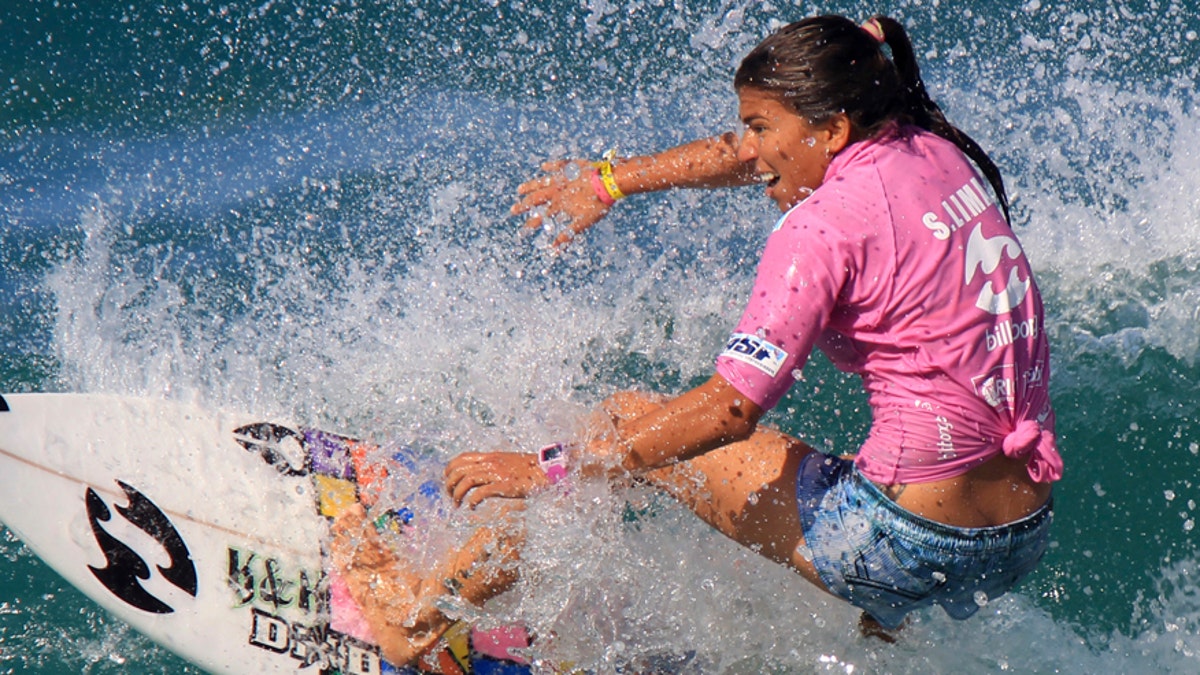
Silvana Lima of Brazil surfs during the women's Association of Surfing Professionals (ASP) Billabong Rio Pro championship on Barra da Tijuca beach in Rio de Janeiro May 15, 2011. REUTERS/Sergio Moraes (BRAZIL - Tags: SPORT) - RTR2MFZF
Brazilian pro surfer Silvana Lima told the BBC that despite her success, she has a hard time getting sponsors because she doesn't look like a model.
“The surf-wear brands when it comes to women, they want both models and surfers," Lima said. "So if you don’t look like a model, you end up without a sponsor, which is what happened to me.”
It became such an issue for Lima that in 2014, the Vice World Champion created the campaign #FreeSilvana in order to raise funds to participate in surf competitions.
But pro surfer -- and model -- Anastasia Ashley told FOX411 that while Lima is blaming her lack of model looks, she maybe missing one key ingredient that has little to do with physical appearance – the “It” factor.
“I think sponsors are attracted to a total package which could be a combination of looks, talent, and personality," Ashley said. "So I think a lot of people mistake looks for getting ahead rather than charisma.”
Karen Post, President of Brain Tattoo Branding, and author of "Brand Turnaround" said brands obviously do indeed look for quote unquote attractive people to pitch their products.
“Sponsors look for many things, often a person's looks weigh in big. We are a visual society and brands can have an aspirational power," Post said. "The reality is this is not limited to brand building but even nightly news coverage. An attractive faced crime victim gets more attention than a plain Jane.”
Scott Pinsker, a Tampa-based brand and marketing expert who has worked with many professional athletes elaborated that athletes sometimes think that because they win the title or the game, they are entitled to huge endorsement deals, but he says the story of the pro is most important.
“To the victor goes the spoils on the playing field, but in corporate America, decisions are based on different metrics. It’s not just how good you are on the field, but how your athletic qualities translate to the world of sales, marketing and brand-building," Pinsker said. "I’ll give an example: Serena Williams is a phenomenal tennis player and arguably the greatest female athlete in American sports history. But if you’re Nike, McDonald’s or General Motors, it’s your job to tell a story about your brand. If you can’t package, communicate and monetize an association with Serena, you’ll associate with someone else. It’s not personal; it’s business.”
Brand strategist Rob Frankel countered that the problem can also be a lack of skill and creativity on the part of a company’s marketing team, and not the athlete in question.
“The first thing you have to realize is that most marketing people on both sides are totally and wholly unqualified for their jobs," Frankel said. "In the era of Photoshop and in the hands of a skilled art director, [Lima] has the basics to be more than pretty enough.”
FOX411 reached out to Lima but did not receive comment.














































